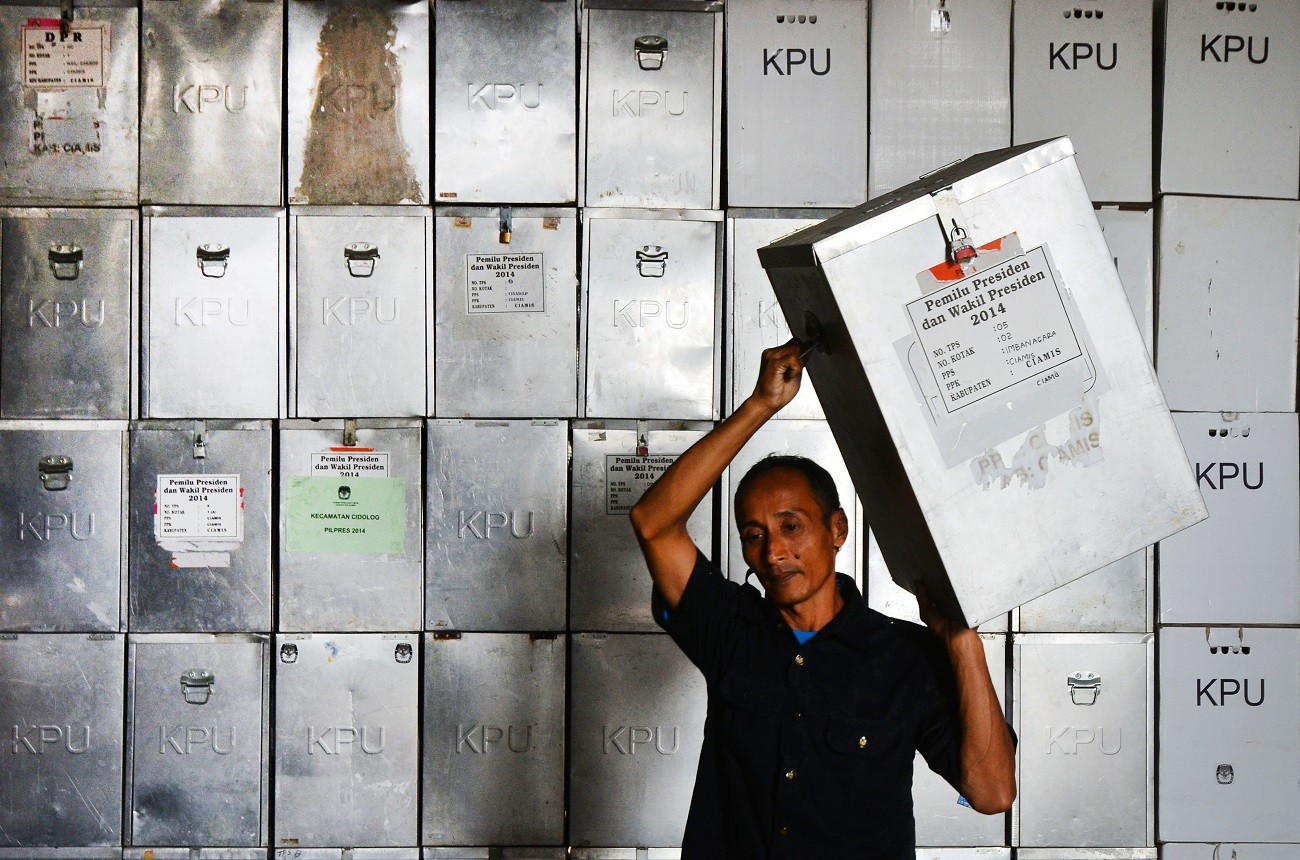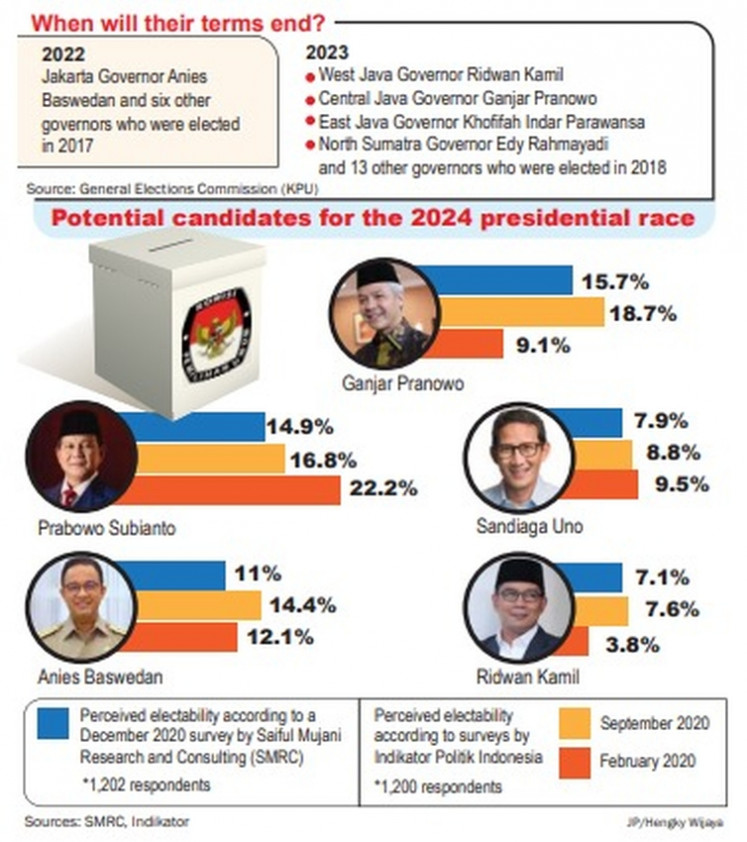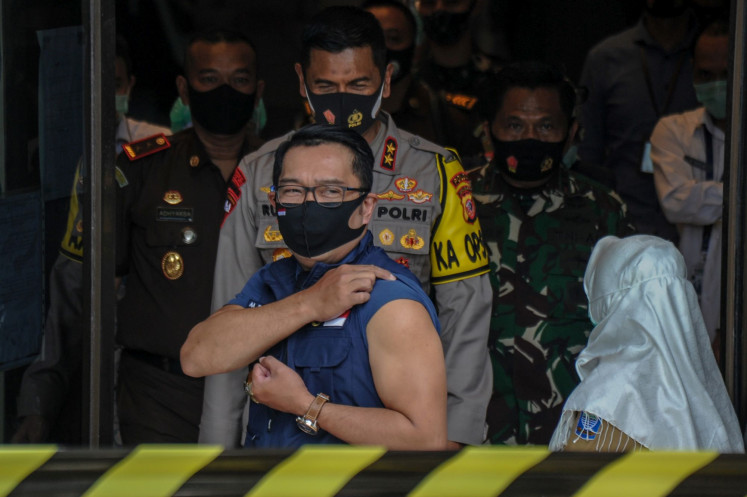Popular Reads
Top Results
Can't find what you're looking for?
View all search resultsPopular Reads
Top Results
Can't find what you're looking for?
View all search resultsLocal leaders face hurdle of delayed polls
Political parties divided over when to hold next regional elections
Change text size
Gift Premium Articles
to Anyone
T
he current election law was only enacted three years ago — but the Indonesian political elites are already debating the possibility of revising it again.
While the proposed revisions concern an array of electoral issues — ranging from a plan to bar members of outlawed organizations from running in elections to the threshold for nominating presidential candidates — the debate clearly centers on the question of whether the nation should hold regional elections in 2022 or push them until 2024, as mandated by the current law.
The matter is more than just a technicality, with analysts saying that the date of the next regional elections could be game-changing for the 2024 presidential race.
Popular regional leaders and potential presidential candidates, such as Jakarta Governor Anies Baswedan, West Java Governor Ridwan Kamil and Central Java Governor Ganjar Pranowo, will end their terms in 2022, 2023 and 2023, respectively.
Pushing the regional polls until 2024 would mean they would lose the political stage that could give them the upper hand in the next presidential race.
President Joko “Jokowi” Widodo, who is barred from seeking a third term, has recently joined the debate and may have swayed the positions of some political factions within the House of Representatives, putting the proposed revisions at risk of being shelved.
Potential candidates (JP/Hengky Wijaya)During a meeting with former members of his campaign team last week, the President, a former mayor of Surakarta who became president after winning the Jakarta election and serving as its governor for two years only, reportedly rejected the proposal to revise the Elections Law, saying that it was too early to do so.
He also argued that holding local elections in 2022 would disrupt the national eff orts to contain the pandemic, according to tempo.co.
The law, enacted in July 2017, combines the Presidential Election Law, the Legislative Election Law and the Election Organizers Law.
A draft revision of the law obtained by The Jakarta Post stipulates that regions that held elections in 2017 and 2018 — including Jakarta, West Java, Central Java, East Java and North Sumatra — will hold the next elections in 2022 and 2023, revising the 2016 Regional Elections Law that mandates that regional elections be held simultaneously in 2024 in line with presidential and legislative elections.
The draft law, which also regulates regional elections, stipulates that simultaneous regional elections, in which governors, mayors, regents and their respective deputies are determined, will only be held in 2027.
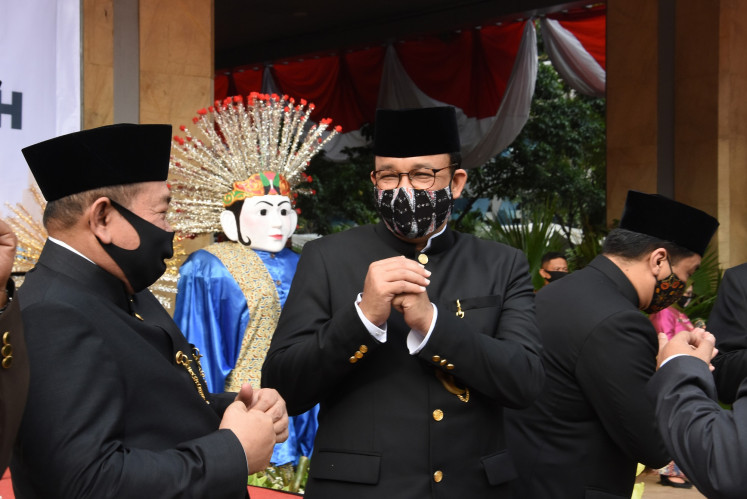 Anies Baswedan (center) greets officials after leading a ceremony to commemorate Jakarta's 493rd anniversary at the City Hall in Central Jakarta on Monday, June 22, 2020. ">
Anies Baswedan (center) greets officials after leading a ceremony to commemorate Jakarta's 493rd anniversary at the City Hall in Central Jakarta on Monday, June 22, 2020. ">
Factions within the House’s Commission II overseeing home affairs, which proposed the revisions, were initially unanimous in including the bill into the House’s legislative program. But five of the pro-government parties — the Indonesian Democratic Party of Struggle (PDI-P), Gerindra Party, Golkar Party, National Awakening Party (PKB) and the United Development Party (PPP) — recently changed their tune and expressed their opposition to the proposed revisions.
Keeping the current election law intact would offer stability and consistency amid constant changes in election rules, which had often left political parties scrambling for adjustment, said Gerindra secretary-general Ahmad Muzani. PPP chairman Suharso Monoarfa concurred, saying that changing election rules way too often would only hamper Indonesia’s transition from procedural to substantial democracy.
“Our procedural democracy is not strong enough because of constant revision of the Elections Law. There is no chance for it to mature, because the election rules keep changing before the election,” Suharso told the Post on Tuesday. “We think it’s not the right time to amend the Elections Law.”
The National Mandate Party (PAN), which claims to be part of neither the ruling coalition nor the opposition, backed the ruling parties. Its chairman, Zulkifli Hasan, said the current regulation was designed to be used for “three to four election periods”.
The three remaining factions — the NasDem Party, the Prosperous Justice Party (PKS) and the Democratic Party — have thrown their support behind the initiative to amend the Elections Law, arguing that simultaneously holding presidential, legislative and regional elections in 2024 would put too much burden on election organizers and voters.
“The strain on the organizers will be overwhelming. It will also be a huge burden for voters [to make well-informed decision] because they will struggle to get adequate access to information on the candidates,” said NasDem’s Saan Mustopa.
Both sides have claimed that their stance regarding the proposed revisions has nothing to do with the chances of regional leaders such as Anies and Ridwan in the 2024 race, saying that the current rule affected many regional leaders.
Speculation, however, is rife that 2024 is a factor in the debate over the date of the next local polls.
West Java Governor Ridwan Kamil shows his left arm after receiving a potential COVID-19 vaccine shot during late-stage trials at Puskesmas Garuda community health center in Bandung, West Java on Sept. 14, 2020. (Antara/Raisan Al Farisi)Anies, Ridwan and Ganjar have already trailed if not surpassed Gerindra leader Prabowo Subianto as the most electable candidates for the 2024 presidential race in many political surveys.
Gerindra, which backed Anies in the 2017 gubernatorial election, reportedly strained its relations with Anies after the party joined the Jokowi administration in 2019.
NasDem, the only member of the ruling coalition to insist that regional elections be held in 2022, is known to have close relations with the two popular regional leaders.
Anies is a cofounder of the National Democrat organization, a precursor of NasDem. Ridwan, meanwhile, is one of the political candidates backed by the party in the 2018 local polls.
Indonesia Political Review executive director Ujang Komarudin said holding regional elections in 2022 and 2023 would provide a crucial advantage for regional leaders who have aspirations to run the presidential campaign in 2024, namely being an active incumbent.
“Regional elections in 2022 and 2023 will provide the room for them [regional leaders] to run for president, because they can run a campaign from a position of the incumbent, while with the regional elections held in 2024, they would no longer have such positions,” said Ujang.
“We know that Jokowi, when he ran his presidential campaign [in 2014], was a sitting governor. If the election is in 2024, Anies, Ganjar or Ridwan will run [their campaigns] from a weakened position.”
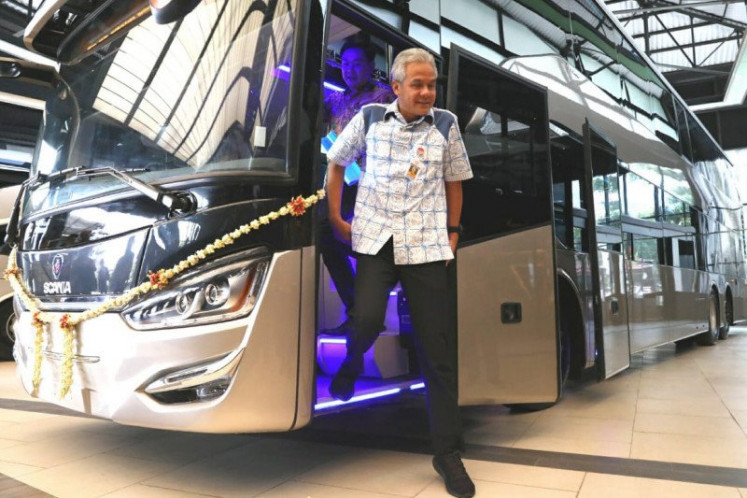 Ganjar Pranowo gets off from one of the double-decker buses to be exported by CV Laksana to Bangladesh. The governor took part in a ceremony to mark the delivery of the buses at the company’s factory in Semarang on Feb. 22, 2020.">
Ganjar Pranowo gets off from one of the double-decker buses to be exported by CV Laksana to Bangladesh. The governor took part in a ceremony to mark the delivery of the buses at the company’s factory in Semarang on Feb. 22, 2020.">
Regardless of the politicking behind the proposal, Titi Anggraini of the Association for Elections and Democracy (Perludem) said canceling the plan to push regional elections to 2024 was necessary, arguing that holding five elections on a single day could be a logistical nightmare.
She questioned the President’s argument that the regional elections should not be held in 2022 so as not to disrupt national efforts to contain the pandemic, given that he himself had insisted on holding regional elections last year — which saw his son and son-in-law run for mayor — despite the pandemic. “This only shows that the government does not have a clear and measured vision and mission in managing Indonesia’s electoral democracy,” said Titi.

